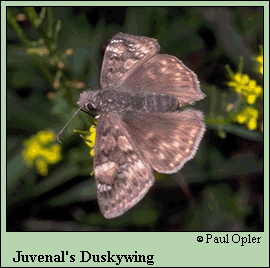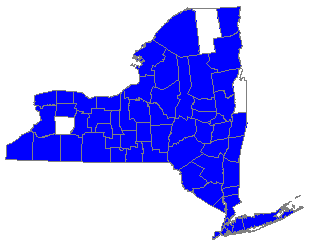 |
 

 |



Juvenal's Duskywing (Erynnis juvenalis [Fabricius])
Wing span: 1 1/4 - 1 15/16 inches (3.2 - 4.9 cm).
Identification: Upperside of male is brown with clear spots, indistinct dark markings, and scattered white hairs; female has larger markings and spots. Underside of hindwing has 2 round pale spots below the apex. Male has a costal fold containing yellow scent scales; female has a patch of scent scales on the 7th abdominal segment.
Life history: To wait for females, males perch in forest clearings or edges on bare twigs about 3-12 feet above the ground; they will often patrol from these perches. Females lay eggs singly on young leaves and seedlings of the host plants. Caterpillars feed on leaves and rest in nests of rolled or tied leaves; fully-grown caterpillars hibernate.
Flight: One brood from April-June, emerging as early as late January in peninsular Florida.
Caterpillar hosts: Tree and shrub oaks (Quercus species).
Adult food: Nectar from flowers of winter cress, dandelion, wild plum, wisteria, blueberry, Carolina vetch, redbud, and lilac.
Habitat: Oak woods or scrub and associated edges or fields.
Range: Nova Scotia and central New England west through southern Manitoba to the Dakotas and northeastern Wyoming; south through most of the eastern United States to Florida, the Gulf states, and Texas. White-fringed populations occur in west Texas, New Mexico, and central Arizona south to central Mexico.
Conservation: Not usually required.
The Nature Conservancy Global Rank: G5 - Demonstrably secure globally, though it may be quite rare in parts of its range, especially at the periphery.
Management needs: None reported.
References:
Opler, P. A. and G. O. Krizek. 1984. Butterflies east of the Great Plains. Johns
Hopkins University Press, Baltimore. 294 pages, 54 color plates.
Opler, P. A. and V. Malikul. 1992. A field guide to eastern butterflies. Peterson
field guide #4. Houghton-Mifflin Co., Boston. 396 pages, 48 color plates.
Scott, J. A. 1986. The butterflies of North America. Stanford University Press,
Stanford, Calif. 583 pages, 64 color plates.
Stanford, R. E. and P. A. Opler. 1993. Atlas of western USA butterflies including
adjacent parts of Canada and Mexico. Denver and Fort Collins, CO.
Tilden, J. W. 1986. A field guide to western butterflies. Houghton-Mifflin Co.,
Boston, Mass. 370 pages, 23 color plates.
Author: Jane M. Struttmann
State and Regional References:
Cech, R. 1993. A Distributional Checklist of the Butterflies and Skippers of
the New York City Area (50-mile Radius) and Long Island. New York City
Butterfly Club Special Publication. 27 pp.
Forbes, W.T.M. 1960. Lepidoptera of New York and Neighboring States. Part
IV: Agaristidae through Nymphalidae Including Butterflies. Cornell Univ.
Agricultural Experimental Station, Ithaca, N.Y. Memoir 371. 188 pp.
Glassberg, J. 1993. Butterflies Through Binoculars: A Field Guide to
Butterflies in the Boston-New York-Washington Region. Oxford Univ. Press,
New York, N.Y. 160 pp.
Klass, C. and Dirig, R. 1992. Learning about Butterflies. Cornell Cooperative
Extension Publication, 4-H Member/Leader Guide 139-M-9. Ithaca, N.Y.
36 pp.
Layberry, R.A., Hall, P.W. & Lafontaine, D.J., 1998. The Butterflies of
Canada. University of Toronto Press, Toronto, ON. 280 pp.
Opler, P.A. 1998. A field guide to eastern butterflies, revised format.
Houghton Mifflin Co., Boston.
Shapiro, A.M. 1974. Butterflies and Skippers of New York State. Cornell Univ.
Agricultural Experimental Station, Ithaca, N.Y. Search 4:1-60.

